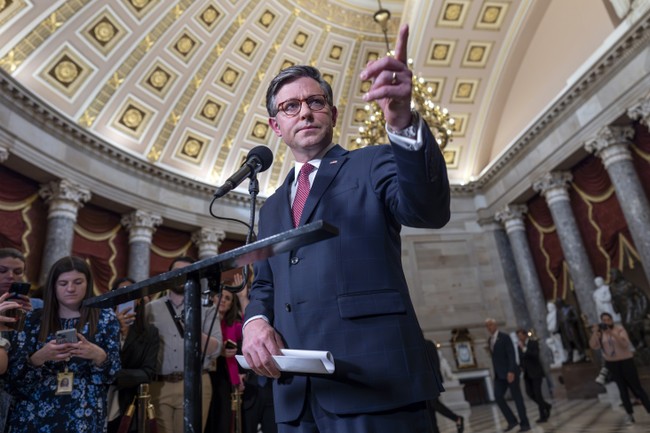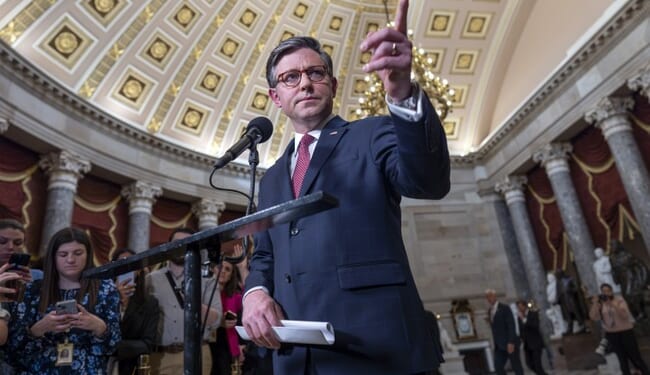
Speaker-of-the-moment Mike Johnson just proved again why Americans have taken to referring to our nation’s capital as the swamp by pulling a legislative fast one and actually pleasing many democrats as well as President Biden.
In a rare Saturday session, the House approved Johnson and Biden’s pet $95 billion project, featuring a fresh new round of cash and prizes for Ukraine, Israel, and other U.S. allies. As AP reported, “Democrats and Republicans banded together after months of hard-right resistance over renewed American support for repelling Russia’s invasion.”
So how to work around that resistance? Make it about more than Ukraine and chuck things some of the more conservative members (including those calling for his head) care more about — like other aid packages and a mechanism to tee up a TikTok ban to make it harder for them. Such a tactic — not at all new, by the way — also makes it very hard for the American people to figure out what pieces their member of Congress actually supports or opposes in the package.
Now I’m not so naïve as to think this kind of thing is new or isn’t going away, but when it comes to big-issue and big-dollar legislation, Congress should vote on one piece at a time and preferably during normal business hours. This is not too much to ask, is it?
Speaker Johnson’s “Saturday night special” legislation contains $61 billion in aid to Ukraine, $26 billion in aid to Israel (including $9 billion for “humanitarian purposes” for Gaza and the West Bank), and $8 billion primarily to protect Taiwan. Just to muddy the waters and to put conservative members who want to see the Chinese divest in TikTok or ban it in the U.S. in a pickle, that item was thrown in. Gets shady in the swamp.
First, I view the TikTok question as politics paling in seriousness or urgency to foreign aid debates while the world is on fire. No matter where you stand on banning it, TikTok is used by 170 million Americans to communicate messages that are protected by the First Amendment.
Furthermore, about 7 million businesses use TikTok, and the app contributes about $24 billion to the U.S. economy according to a TikTok spokesman. It is a fact that banning the platform will impact its many American investors and users. Based on this alone, there should have been a stand-alone vote, and it shouldn’t have been relegated to what I’ll call Freedom Caucus bait.
This is a cynical move, to the degree that one might call it obnoxious. No attempts were made to offset all the new spending in this — latest — $100 billion package. Further, speaking of add-ons, many in Congress wanted a strong border security measure, a serious and urgent issue if ever there was one, to be added to this package but they were rebuffed.
Heaven help us if the Speaker were to offend the President and the Democrats, I guess. Instead of rolling out a bill with the border security measure and all the foreign aid added to genuinely meet them halfway, he puts a TikTok knife to the throat of conservatives.
Finally, and I suspect that the Speaker is well aware of this fact, there is something called the Bill of Rights that stands in the way of the TikTok bill becoming law. There was, for example, little to no discussion about the fact that a federal judge in Montana blocked a statewide TikTok ban because it was unconstitutional. When then-President Donald Trump tried to use executive power to ban the app, a federal judge blocked that effort as well, citing First Amendment speech and due process as reasons. It is unfortunate that Congress passes legislation they know full well will be challenged in federal courts.
Adding TikTok to the bill that funds the defense of Ukraine and Israel was a cynical move and an attempt to put pressure on conservatives to support the effort. It failed to garner enough support to tamp down on talk of challenges to Speaker Johnson’s grip on power. It also failed the test of being constitutional and a fair way to pass legislation.

